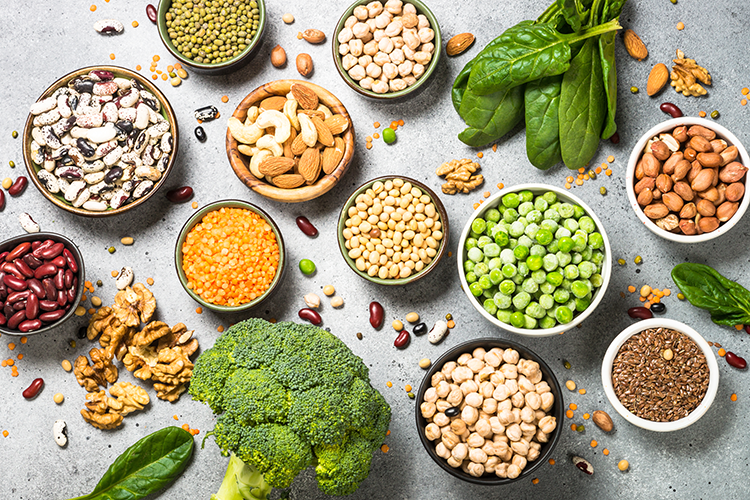Environmental, health and animal welfare triggered an explosion of plant-based food products. At the same time, foods such as milks, meats, ice creams, creamers, cheese and yogurts come with their own challenges and solutions. Besides stability and texture, the market demands cleaner labels. As a result, ingredients such as Citri-Fi® citrus fiber emerged to provide the market a highly functional clean label option. This upcycled citrus fiber provides water holding and emulsification when formulating plant-based foods. As a result, these functionalities provide stability and more natural mouthfeel and texture with cleaner labels.
Free-from, fake, faux, replacements, substitutions and alternatives are just a few descriptors thrown around when referring to non-meat and non-dairy food products. The hot plant-based food trend continues to spur this lexicon exercise. Today, consumers choose a plant-based diet on their set of values and beliefs which vary from person to person. For instance, some are concerned with the environmental impact, the carbon foot print and sustainability when purchasing foods. Others believe that the plant-based diet will curb them from onset diseases like diabetes, cardiovascular disease, obesity and hypertension. And some do not believe in slaughtering animals when there are other protein options available today. Regardless the reason, the industry is in full throttle formulating plant-based foods.
Plant-based Foods: Types and Formats
Decades ago, companies sold ground up vegetables and legumes in the form of vegetarian patties. Today, the market offers a variety of plant-based formats such as milks, meats, creamers, meals, ice cream, yogurts, butter, RTD beverages, bars, dressings and eggs. According to the Plant-based Foods Association, the largest market share includes milk ($2.5B) and meats ($1.4B). (SPINS, 2021) And the fastest growing categories consists of eggs (42%), creamers (33%) and RTD beverages (22%). (SPINS, 2021) Yet, all these plant-based categories come with challenges and solutions when formulating plant-based foods.
Formulator tool boxes evolved over the years to include several ingredients including starches, food gums and plant-based proteins. Yet, today, product developers are seeking more natural and clean label ingredients that provide multiple functionalities. Citrus fiber is one ingredient that meets those parameters. However, not all citrus fibers are the same. These fibers vary depending on their process and composition. For example, Citri-Fi is an upcycled citrus fiber that is produced from a process free from chemical modifications. The composition consists of insoluble fiber, soluble fiber (mostly pectin) and some protein. Because of this, Citri-Fi provides a high degree of functionality – water holding and emulsification – at low usage levels (<1%).
Below lists how Citri-Fi citrus fiber creates stability and natural texture when formulating plant-based foods:
Plant-based Milks
Plant-based milks typically use a variety of bases including oats, soy, almond and coconut. Commercial products tend to use stabilizers to help suspend fortifying ingredients and to create a fuller mouthfeel. However, some of these stabilizers fall suspect in terms of clean label.
Citri-Fi citrus fiber provides not only a full body mouthfeel but also stability when used at less than 1% with homogenization. Because of this, other stabilizers are not needed. As a result, labeling stays clean since Citri-Fi’s labeling options include citrus fiber, dried citrus pulp or citrus flour.
Meat Substitutes
Formulating meat substitutes are trickier. First, meat alternatives come in a variety of formats such as patties, nuggets, sausages and deli cuts. Each format requires different processes and textures. Secondly, the market demands cleaner labels. As a result, product developers steer away from ingredients like methylcellulose which originally was the poster child ingredient when creating meat-like plant-based meats.
Today, the industry offers several new solutions including Citri-Fi citrus fiber. For instance, Citri-Fi 100 series, at <1% usage, provides the emulsification which produces the juiciness and succulence. And the Citri-Fi TX, at 2-4% usage, creates the meat-like texture. When used together, they provide binding and firmer texture. At the same time, when they are used in conjunction with plant proteins like potato or canola, the synergies allow formulators to create methylcellulose-free meat substitutes.
Dairy-free Ice Cream
Again, dairy-free ice cream uses a variety of bases like plant milks. To prevent ice crystallization, these non-dairy ice creams require stabilizers. Without them, the ice crystals compromise the texture creating a sandy and crunchy mouthfeel. On the other hand, some stabilizers lack the water binding during freeze/thaw conditions. As a result, the texture takes on a gummy mouthfeel.
Citri-Fi citrus fiber may not be top-of-mind in frozen dairy-free ice creams. However, this natural ingredient binds water and oil/fats tightly, at <1% usage, even during freeze/thaw conditions. The lack of ice crystallization creates ice creams with a creamy and smooth mouthfeel. And this natural citrus fiber cleans up labels which resonates well in the natural markets.
In addition to the above, Citri-Fi’s high functionality also plays a role when formulating plant-based foods such as creamers, dairy desserts, cheeses, yogurts, bars, dressings and eggs. Citri-Fi is non-allergenic, gluten-free and Non-GMO Project certified. This natural citrus fiber also has no E-number. To learn more about Citri-Fi’s functionalities within plant-based products, please contact us.



